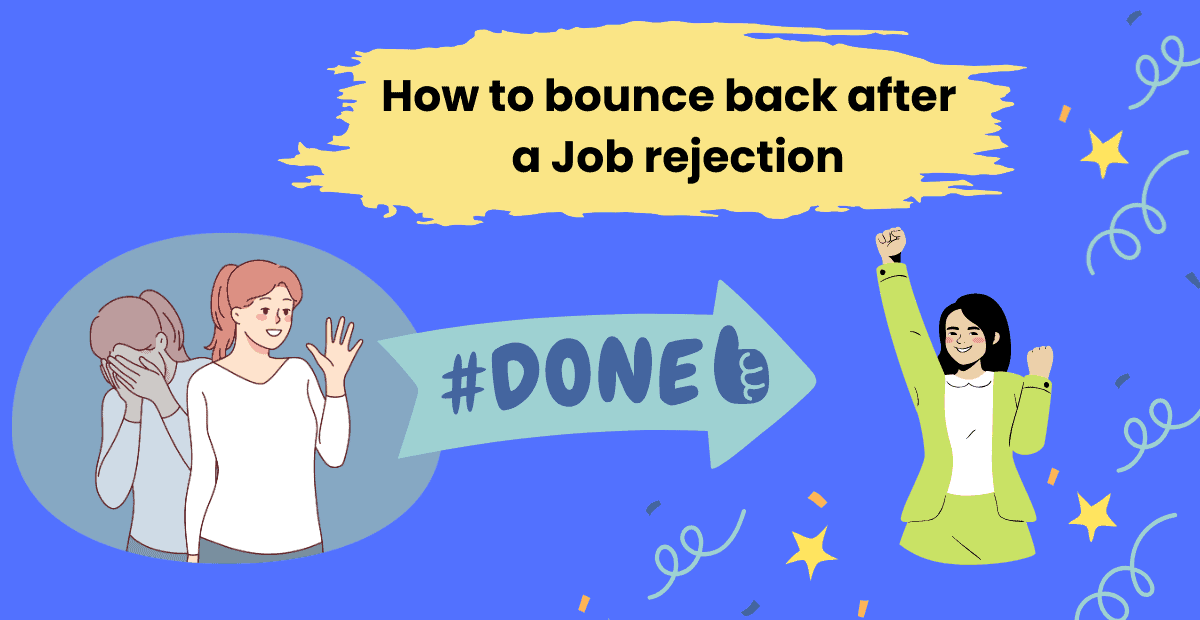Steps to Bounce Back After Being Rejected from Your Dream Job and Land It

Table of Contents
Key Takeaway
- Experiencing job rejection is common, with 75% of resumes facing rejection before reaching hiring managers, but it’s crucial to persevere.
- Understanding the reasons behind rejection, seeking constructive feedback, and utilizing platforms like LinkedIn for networking can help turn setbacks into opportunities.
- Reflecting on interview performance, developing skills, exploring alternate career paths, and enhancing qualifications are critical steps in overcoming rejection and pursuing desired jobs.
- Maintaining positivity, using rejection as motivation, seeking constructive opportunities for personal development, and adapting strategies based on past experiences can ultimately lead to success in securing dream job offers.
1. Introduction
Experiencing being rejected while trying to land your dream job can be disheartening and demotivating, but it’s important to remember that it’s not the end of your journey. According to this job search report, 75% of resumes are rejected before they reach the hiring manager.
We take you through various strategies and steps to overcome the setback of getting turned down, learn from the experience, and propel your job search forward.
2. How to Deal with Rejection from Your Dream Job
Understanding the Reasons for Rejection
After a job interview, clarifying why you were rejected is essential to improve your chances of getting your desired job. Understanding whether it was due to qualifications, skills, or cultural fit can help you address any gaps and improve your future job applications.
Asking for Constructive Feedback
After being turned down for a position, don’t hesitate to ask the recruiter for feedback. Constructive feedback can offer valuable insights into areas needing improvement and how to enhance your prospects.
Utilizing LinkedIn for Networking Opportunities
LinkedIn can be a powerful platform for expanding your professional network. Engage with professionals in your field, connect with industry leaders, and stay updated on job postings and industry trends to broaden your opportunities.
3. Steps to Overcome Job Rejection and Continue Pursuing Your Dream Job
Reflecting on the Interview Process
Take time to reflect on your interview performance. Identify what went well and areas where you can improve. Use this self-assessment to better prepare for the following interview.
Developing Personal and Professional Skills
Invest in your personal and professional growth by acquiring new skills or certifications to enhance your qualifications and make you a more competitive candidate in your job search.
Exploring Other Career Path Opportunities
While pursuing your desired job, consider exploring other career opportunities that could help you land the job. Being open to alternate pathways may lead to fulfilling roles and aid in your professional development.
4. Ways to Get Noticed by Hiring Managers and Recruiters
Enhancing Qualifications and Skill Sets
Continuously work on enhancing your qualifications and skill sets. Consider further education, online courses, or professional development programs to make yourself more valuable to potential employers and increase your chances of landing your desired job.
Effective Strategies for Job Search and Application
Develop a strategic approach to your job search and applications. Tailor your resume and cover letter for each position, and utilize keywords that align with job postings to capture the attention of hiring managers and recruiters to help you get the job.
Approaching the Interviewer and Hiring Manager
Consider contacting the interviewer to express your continued interest in the organization. Requesting an informational interview can offer an opportunity to learn more about the company and showcase your commitment to the role.
5. Dealing with Disappointment and Moving Forward in Your Job Search
Maintaining Positivity and Resilience
When striving to find a job, it’s crucial to maintain a positive outlook and resilience in the face of rejection. Embracing a proactive mindset and staying motivated is essential in guiding your job search back into gear.
Utilizing Rejection as a Motivating Factor
Use rejection as a motivating factor to push yourself further and take the steps to land your dream job. Let it serve as a driving force to strengthen your determination, improve your skills, and refine your approach to finding your desired job.
Pursuing Constructive Opportunities for Personal Development
Seek constructive opportunities for personal development to overcome and handle rejection during your job search. Whether volunteering, taking on freelance projects, or participating in industry events, these experiences can help expand your network and skill set while keeping you engaged in your career pursuits.
6. Turning Job Rejection into Successful Job Offers
Learning from the Rejection Experience
Take the rejection experience as a learning opportunity to bounce back. Reflect on what you’ve gained from the process, and use it to refine your approach and mindset as you continue pursuing your desired job.
Approaching the Hiring Manager for Other Openings
If there are other opening positions within the organization where you got turned down, consider reaching out to express your interest and potentially get the job. Recruiters may view your persistence as a positive attribute and consider you for alternative opportunities that align with your skills and aspirations to help you get your dream job.
Adapting Interview Strategies Based on Previous Rejections
Adapt your interview strategies based on the feedback received and your prior rejection experiences. Utilize these insights to refine your approach and convey how you’ve worked on addressing potential concerns in future interviews.
7. Conclusion
Facing rejection in a job interview can be disheartening, but remember to use it as a tool to overcome rejection; it’s not a reflection of your worth or abilities.
So what if you were rejected in the job application? Use each rejection as a learning experience and continue to improve yourself. With the right mindset, perseverance, and determination, you will ultimately find a job that perfectly fits your skills and goals.
Remember to keep pushing forward and persevering in your efforts, which will positively influence your job search journey.
8. Frequently Asked Question
Q: How can I bounce back after getting rejected?
A: First, ask for feedback from the interviewer if possible. Then, review what went wrong and consider if there are alternate ways to improve. Use this experience to better prepare for the following job interview.
Q: What steps should I take after being rejected from a job?
A: Take time to reflect on the experience, but don’t dwell on it. Update your resume and cover letter, continue applying for similar positions, and consider seeking additional skills or expertise to improve your chances for the next opportunity.
Q: How do I ensure I land every job I apply for?
A: While it’s unlikely that you’ll land every job you want, you can increase your chances by honing your interview skills and following up with a thank you email after an interview. It’s also important to stay proactive in your job search.
Q: What if I don’t get the job after the interview?
A: If you didn’t get the job, stay positive and keep moving forward. Rejection isn’t easy, but it’s part of the process. Remember that there will be other opportunities and that the right job is there for you.
Q: Should I ask for feedback if I didn’t get the job?
A: Yes, if possible, make sure you ask for feedback from the interviewer. Understanding why you weren’t selected can help you improve for future interviews.
Q: What are some alternate ways to approach job rejections?
A: Rather than dwelling on being rejected, consider contacting other companies or seeking different opportunities that align with your skills and interests. You can even approach a career coach for a one-to-one talk to realign your job search approach.
Q: What if I do not hear back from employers after applying?
A: If you’re not hearing back, thank the employer for their time in considering your application and follow up if appropriate. Exploring job opportunities through online platforms like indeed.com and listening to podcasts for additional job search tips and advice is also beneficial.
